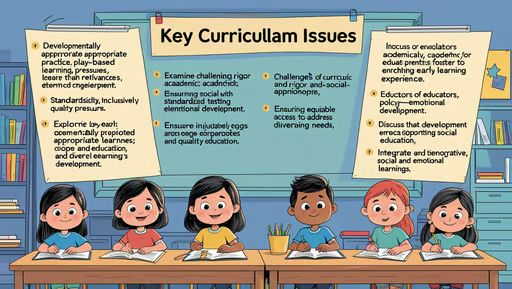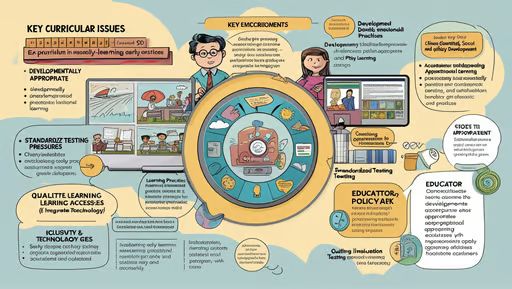Curricular Issues in Early Childhood Education, Early childhood education (ECE) is a critical phase in a child’s development, laying the foundation for lifelong learning, social skills, and cognitive abilities. However, the design and implementation of curricula in ECE face numerous challenges that can impact the quality of education and developmental outcomes. This article explores key curricular issues in early childhood education, including standardization, cultural relevance, teacher preparedness, and the balance between academic and play-based learning.
Standardization vs. Individualization
One of the most pressing issues in ECE curricula is the tension between standardization and individualization. Standardized curricula are often designed to ensure consistency and measurable outcomes across educational settings. However, such approaches may not account for the diverse needs, interests, and developmental stages of individual children. Early childhood is a period of rapid growth, and children develop at varying rates. A one-size-fits-all curriculum can hinder the ability of educators to cater to these differences, potentially leading to disengagement or frustration among young learners. Critics argue that overly rigid curricula may stifle creativity and fail to nurture the unique potential of each child. On the other hand, a lack of structure can result in inconsistent learning experiences. Striking a balance between standardization and flexibility is essential to create a curriculum that supports both individual growth and collective learning goals.

Cultural Relevance and Inclusivity
Another significant issue in ECE curricula is the lack of cultural relevance and inclusivity. Many early childhood programs are based on Western educational models, which may not align with the cultural values, traditions, and languages of diverse communities. This disconnect can alienate children from minority backgrounds and limit their engagement in learning activities. For example, a curriculum that emphasizes holidays, stories, or practices from a dominant culture may marginalize children whose experiences are not represented. Culturally responsive curricula, on the other hand, incorporate the histories, languages, and traditions of all children, fostering a sense of belonging and respect for diversity. Addressing this issue requires intentional efforts to involve families and communities in curriculum development and to train educators in culturally responsive teaching practices.
Teacher Preparedness and Professional Development
The effectiveness of any curriculum depends largely on the skills and knowledge of the educators implementing it. However, many early childhood teachers face challenges related to inadequate training and professional development. ECE curricula often require educators to adopt innovative teaching methods, such as play-based learning, inquiry-based approaches, and differentiated instruction. Without proper training, teachers may struggle to implement these strategies effectively, leading to suboptimal learning experiences for children. Additionally, the low status and compensation of early childhood educators in many regions contribute to high turnover rates, further exacerbating the issue. Investing in comprehensive teacher preparation programs and ongoing professional development is crucial to ensure that educators are equipped to deliver high-quality, curriculum-aligned instruction.
Balancing Academic and Play-Based Learning
The debate over the balance between academic and play-based learning is another contentious issue in ECE curricula. In recent years, there has been a growing emphasis on academic readiness, driven by concerns about school performance and global competitiveness. This has led to the inclusion of more structured, academic content in early childhood programs, such as literacy and numeracy activities. While these skills are important, an overemphasis on academics can come at the expense of play, which is essential for social, emotional, and cognitive development. Play-based learning allows children to explore, experiment, and make sense of the world in a way that is developmentally appropriate. Critics argue that pushing formal academics too early can lead to stress, burnout, and a negative attitude toward learning. A well-rounded curriculum should integrate both academic and play-based elements, recognizing the value of each in supporting holistic development.
Assessment and Accountability
Assessment practices in early childhood education also present significant challenges. Traditional assessment methods, such as standardized testing, are often ill-suited for young children, who may not yet have the language or cognitive skills to demonstrate their learning in formal ways. Moreover, excessive focus on assessment can lead to a narrow curriculum that prioritizes testable skills over broader developmental goals. Alternative assessment methods, such as observational assessments and portfolios, are more aligned with the principles of ECE but require significant time and expertise to implement effectively. Policymakers and educators must work together to develop assessment strategies that provide meaningful insights into children’s progress without compromising the integrity of the curriculum.
Conclusion
Curricular issues in early childhood education are complex and multifaceted, requiring careful consideration of the diverse needs of young learners, their families, and educators. Addressing these challenges involves finding a balance between standardization and individualization, ensuring cultural relevance and inclusivity, investing in teacher preparedness, and integrating academic and play-based learning. Additionally, assessment practices must be developmentally appropriate and aligned with the goals of ECE. By addressing these issues, stakeholders can create curricula that support the holistic development of children and lay a strong foundation for their future success. Early childhood education is not merely a preparation for later schooling but a vital stage in its own right, deserving of thoughtful and inclusive curricular design.

6 thoughts on “Curricular Issues in Early Childhood Education”
Comments are closed.